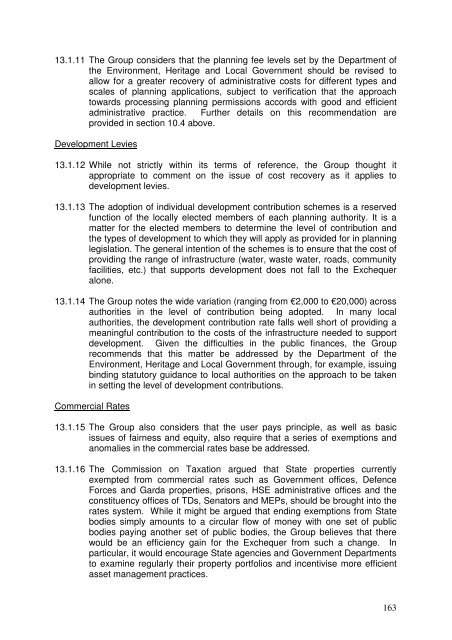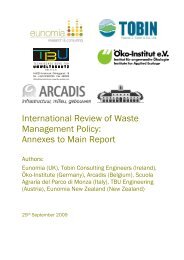Report of the Local Government Efficiency Review Group
Report of the Local Government Efficiency Review Group
Report of the Local Government Efficiency Review Group
Create successful ePaper yourself
Turn your PDF publications into a flip-book with our unique Google optimized e-Paper software.
13.1.11 The <strong>Group</strong> considers that <strong>the</strong> planning fee levels set by <strong>the</strong> Department <strong>of</strong><br />
<strong>the</strong> Environment, Heritage and <strong>Local</strong> <strong>Government</strong> should be revised to<br />
allow for a greater recovery <strong>of</strong> administrative costs for different types and<br />
scales <strong>of</strong> planning applications, subject to verification that <strong>the</strong> approach<br />
towards processing planning permissions accords with good and efficient<br />
administrative practice. Fur<strong>the</strong>r details on this recommendation are<br />
provided in section 10.4 above.<br />
Development Levies<br />
13.1.12 While not strictly within its terms <strong>of</strong> reference, <strong>the</strong> <strong>Group</strong> thought it<br />
appropriate to comment on <strong>the</strong> issue <strong>of</strong> cost recovery as it applies to<br />
development levies.<br />
13.1.13 The adoption <strong>of</strong> individual development contribution schemes is a reserved<br />
function <strong>of</strong> <strong>the</strong> locally elected members <strong>of</strong> each planning authority. It is a<br />
matter for <strong>the</strong> elected members to determine <strong>the</strong> level <strong>of</strong> contribution and<br />
<strong>the</strong> types <strong>of</strong> development to which <strong>the</strong>y will apply as provided for in planning<br />
legislation. The general intention <strong>of</strong> <strong>the</strong> schemes is to ensure that <strong>the</strong> cost <strong>of</strong><br />
providing <strong>the</strong> range <strong>of</strong> infrastructure (water, waste water, roads, community<br />
facilities, etc.) that supports development does not fall to <strong>the</strong> Exchequer<br />
alone.<br />
13.1.14 The <strong>Group</strong> notes <strong>the</strong> wide variation (ranging from €2,000 to €20,000) across<br />
authorities in <strong>the</strong> level <strong>of</strong> contribution being adopted. In many local<br />
authorities, <strong>the</strong> development contribution rate falls well short <strong>of</strong> providing a<br />
meaningful contribution to <strong>the</strong> costs <strong>of</strong> <strong>the</strong> infrastructure needed to support<br />
development. Given <strong>the</strong> difficulties in <strong>the</strong> public finances, <strong>the</strong> <strong>Group</strong><br />
recommends that this matter be addressed by <strong>the</strong> Department <strong>of</strong> <strong>the</strong><br />
Environment, Heritage and <strong>Local</strong> <strong>Government</strong> through, for example, issuing<br />
binding statutory guidance to local authorities on <strong>the</strong> approach to be taken<br />
in setting <strong>the</strong> level <strong>of</strong> development contributions.<br />
Commercial Rates<br />
13.1.15 The <strong>Group</strong> also considers that <strong>the</strong> user pays principle, as well as basic<br />
issues <strong>of</strong> fairness and equity, also require that a series <strong>of</strong> exemptions and<br />
anomalies in <strong>the</strong> commercial rates base be addressed.<br />
13.1.16 The Commission on Taxation argued that State properties currently<br />
exempted from commercial rates such as <strong>Government</strong> <strong>of</strong>fices, Defence<br />
Forces and Garda properties, prisons, HSE administrative <strong>of</strong>fices and <strong>the</strong><br />
constituency <strong>of</strong>fices <strong>of</strong> TDs, Senators and MEPs, should be brought into <strong>the</strong><br />
rates system. While it might be argued that ending exemptions from State<br />
bodies simply amounts to a circular flow <strong>of</strong> money with one set <strong>of</strong> public<br />
bodies paying ano<strong>the</strong>r set <strong>of</strong> public bodies, <strong>the</strong> <strong>Group</strong> believes that <strong>the</strong>re<br />
would be an efficiency gain for <strong>the</strong> Exchequer from such a change. In<br />
particular, it would encourage State agencies and <strong>Government</strong> Departments<br />
to examine regularly <strong>the</strong>ir property portfolios and incentivise more efficient<br />
asset management practices.<br />
163
















